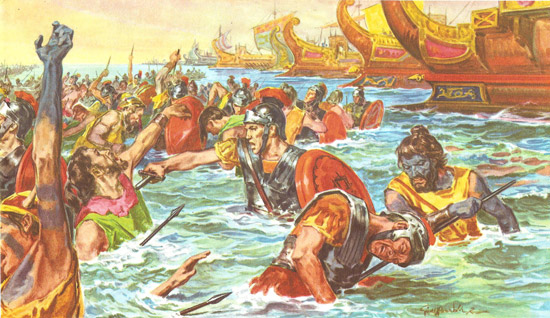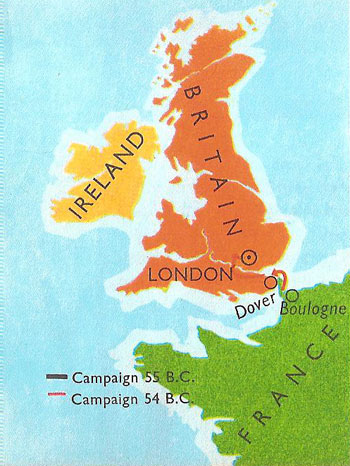Caesar in Britain

The Roman standard-bearer jumped into the midst of hundreds of enemy troops, determined to fight to the death. After some fierce fighting, the Romans finally reached the shore.

DID YOU KNOW THAT
· Cassivellaunus is the first inhabitant of this country whose name we know.
· The name Britain is associated with woad. The Latin 'Britanni' comes from an old Celtic word 'Pretani' which meant painted or tattooed.
· the largest force ever to have attacked this country was the one that Caesar led in 54 BC.
· Caesar was over 40 years of age before becoming a soldier.
It was probably in the year 56 BC that Julius Caesar had his first sight of Britain. For the last three years he had been campaigning in Gaul (France), and his conquest of that country was by then nearly complete. In the following year he would be able to undertake some new adventure and there were two things he could do.
Either he could cross the Rhine and mount a full-scale invasion of Germany, or he could cross the Channel and invade Britain. There was a lot to be said for the first of these alternatives, as the Germans had always been a great danger to Gaul. Also the expedition to Britain would involve a large naval operation, and the Romans had never been great sailors. However, in spite of this Caesar decided that he would go to Britain in 55 BC.
There were probably three main reasons for this decision. In the first place the British had been helping the Gauls and it would do no harm to teach them a lesson. Secondly he had all an explorer's curiosity to visit a strange and unknown country. For Britain at that time was a land of mystery: there were many legends but few known facts. It was famous for its tin and was sometimes known as the 'Tin Island'. It was known to be the headquarters of the Druids who were a society of holy men who had tremendous power both in Britain and Gaul. It was also known that the inhabitants of Britain painted themselves with a blue dye called woad. There were also numerous rumors: Britain contained gold and pearl fisheries; it was part of Hades; it was the edge of the world. To someone of Caesar's scientific and enquiring mind the urge to go and see for himself must have been enormous. The third reason was that the Romans at home would be more excited by an invasion of the remote and mysterious Britain than by an invasion of Germany.
Accordingly Caesar ordered preparations for an expedition to Britain. Before he could set out, however, he had to turn aside to deal with the Germans who had again crossed the Rhine and were preparing to settle in Gaul. The operation that followed showed Caesar at his best - and his most ruthless. The Germans were first of all tricked, then defeated and then mercilessly massacred. Moreover, Caesar followed this up by constructing a bridge across the Rhine in the amazingly short time of eight days, and led his army across on a short expedition.
All this meant that it was not until the end of August that Caesar was able to set sail for Britain. Even then he was not really ready: he was only able to take about 12,000 men in 80 ships. For cavalry he relied on the conquered tribes of Gaul, and they were to follow later.
Almost from the first Caesar ran into serious problems. When after seven hours' sailing he reached the cliffs of Dover, it was clear that he couldn't land there. The Britons had mustered on the top of the cliffs and were ready to pour down a torrent of weapons and stones on to the beaches below. Another less dangerous landing place had to be found.
Caesar then sailed round the coast of Kent and is believed to have landed near to the present-day town of Deal. Even there he had the greatest difficulty in forcing a landing. The Britons dashed into the sea, sometimes even driving in their chariots, and fought so fiercely that the Romans hesitated; they were uncertain of the depth of the sea and were unwilling to leave their boats. Suddenly the standard-bearer of the Tenth Legion, crying out to the other soldiers to follow him, leaped into the sea, and bearing the great eagle aloft, advanced upon the enemy. Now the Romans hesitated no longer, as it was considered the greatest dishonor to lose their standard to the enemy. The brave standard-bearer was supported on all sides, and together they forced their way ashore.
Even then there was furious fighting. The Romans, who were without cavalry, suffered particularly from the attacks of the British chariots. The British had no proper calvary, as their horses were too small, so they went to battle in chariots drawn by two ponies. These, however, were driven at great speed and were maneuvered with amazing skill.
Eventually, however, Roman discipline and bravery triumphed; the Britons were driven back inland, and soon their leaders came to Caesar with requests for peace, which he granted. It seemed that the Britons would be easily conquered, but then two disasters occurred. In the first place news arrived that the cavalry had run into a storm and had been compelled to return to Gaul. This meant that Caesar couldn't advance any further into Britain. The second was even more serious: Caesar's own ships were badly damaged. These had, he thought, been safely beached, but neither he nor anyone else understood about tides – in the Mediterranean after all, there were none. A few days later there was a high tide and his ships were set adrift. Great damage had been done and there was now a danger that Caesar would be stranded in Britain with only a small army and without enough food and supplies. The Britons, sensing that he was in trouble, ended their truce and made an attack.
However, at times of crisis the Romans were at their best. In a pitched battle the Britons were easily defeated, and then the soldiers turned their attention to mending the ships – not an unduly difficult task for men who had thrown a bridge across the Rhine in eight days.
Caesar now realized that he must return to Gaul. Accordingly he made the Britons promise to pay tribute, took a number of hostages from them – and sailed away. In his account of the expedition Caesar by clever writing made it appear that it had been a great success. However, if he had been absolutely truthful, he would have admitted that it had really been rather a failure.
Next year (54 BC) Caesar came in much greater force.
This time he brought with him 50,000 infantry and 2,000 cavalry in 800 ships.
When the Britons saw this great armada they at once withdrew to their strongholds
inland and chose as their leader a tribal chief called Cassivellaunus. This
time Caesar had no difficulty in landing, and at once set out into the interior
of the country. However, he soon had to turn back, as once again his ships
had been caught by a high tide and had been badly damaged. Later he set
out again and this time reached the Thames. Here the Britons were hoping
to halt him, but at the ford of Brentford he forced his way across.
After this Cassivellaunus asked Caesar for peace and promised to pay tribute,
Caesar agreed, as he was anxious to get back to Gaul where a number of revolts
had occurred, and also to Rome where a civil war was soon to break out between
himself and his great rival, Pompey. And so Caesar left Britain after a visit
of only a few weeks, and it was nearly another hundred years before a Roman
army again came to Britain.
